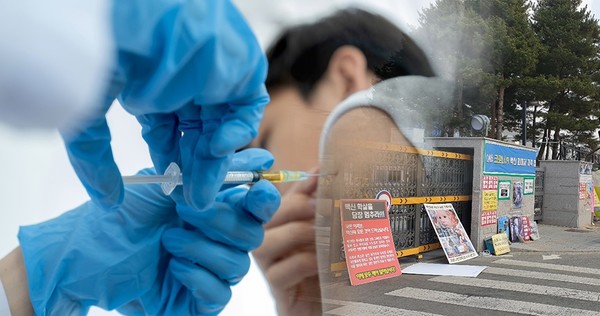The Covid-19 pandemic did not come to an end in 2021. The pandemic was the most worrying social issue this year. Korea has been fighting Covid-19 for two years but is still struggling. The pandemic was not the only issue in the medical community this year. For the first time in the world, Korea enacted legislation to mandate the installation of surveillance cameras in operating rooms. Korea Biomedical Review has compiled the five biggest medical industry stories in 2021. – Ed.

Korea began the first Covid-19 vaccination for residents and workers in nursing homes aged 65 or under on Feb. 26, and hospital workers directly treating Covid-19 patients on Feb. 27.
The Covid-19 vaccination for high-risk groups and healthcare workers continued through the second quarter. In addition, first responders of Covid-19, residents of mental and rehabilitation facilities vulnerable to cluster infections, and healthcare professionals at medical institutions received Covid-19 jabs first.
From the third quarter, the large-scale rollout of vaccines continued consecutively for adults with chronic diseases, the population aged 50 to 64, military and police officers, firefighters, other essential social maintenance personnel, workers in education and childcare facilities and adults aged 18 to 49.
There have been glitches such as cold chain issues, the shortage of vaccines, and confusion in the reservation system. However, those issues were not big enough to stop the vaccination program.
As of Dec. 23, 95.1 percent of people aged 18 or more had at least one dose of a Covid-19 vaccine, and 92.8 percent, two doses of a vaccine.
Still, people inoculated in the early stage of the vaccine program are reporting breakthrough infections.
About 27 percent of the Korean population, and 64.9 percent of those aged 60 or more, had a third booster shot.
The health authorities emphasize the importance of getting a booster jab to prevent another wave of the Covid-19 and encourage vaccination by introducing a “vaccine pass” in public places such as restaurants.
However, controversies over adverse reactions of Covid-19 vaccines have been brewing since February.
Media reports widely covered cases of deaths and serious illnesses of the vaccinated people who failed to get the government’s compensation for damage because the health authorities could not find the causal relationship between those cases and vaccination.
The most contentious issue of the parliament audit in October was the side effects of the Covid-19 vaccines. After vaccination, patients suffering from serious diseases and their guardians appeared in the National Assembly to urge the government’s damage compensation.
Under the mounting pressure to expand the criteria for recognizing causality, the health authorities set up an independent safety committee to evaluate new adverse reactions.
The National Academy of Medicine of Korea launched the Covid-19 Vaccine Safety Committee, consisting of 22 experts, on Nov. 12. It said the committee would prepare a basis for determining causality by examining population groups' incidence and mortality rates.
After the government attempted to ease social distancing to return to normalcy, new daily Covid-19 cases spiked, and the effect of vaccines among those who were inoculated earlier this year started to wane. Consequently, the importance of getting a booster shot grew, and the Covid-19 vaccination issue is likely to continue through early 2022.

